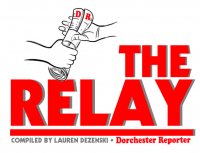April 9, 2015

Monday night’s Columbia-Savin Hill Civic Association’s monthly meeting was a case study in how the city hopes to change hearts and minds around the Olympic bid, as Marty Walsh told us last week he’s hoping to do. It’s also a timely snapshot of where things stand this week—at least its better than those rumored 2024 robocalls.
John FitzGerald, the city’s liaison between 2024 and the mayor, presented to the civic association’s monthly meeting. Back in the mid-1990s, this particular civic group was led by one Martin J. Walsh. It remains, quite solidly, Walsh country.
FitzGerald, it must be said, is in a tough spot at these public meetings. He tries to make that clear up front to those in attendance.
“I want to hear your concerns on a more local level. Tell me how will these Games impact your quality of life so I can tell the Mayor,” FitzGerald told the crowd of 35 people gathered in the small gymnasium of the Little House on East Cottage Street. “We know Mayor Walsh didn’t run for mayor for the Olympics. This is an opportunity to advance his agenda at a quicker rate.”
FitzGerald is attending all 220 civic association meetings in the city–and some more than once– as part of his portfolio, which also includes outreach to local businesses. However, because he is not a member of 2024’s inner circle, FitzGerald is working off old or outdated information, much of which comes straight out of the January bid documents.
If anything, it seems unfair that Fitz is the one catching the heat for questions he has not been empowered to answer to begin with. Maybe this is why relations between Walsh’s team and 2024 officials are a bit frayed.
But back to Monday’s meeting itself: Columbia-Savin Hill Civic presents a real litmus test for where locals stand on the Games. Not only is this literally Marty’s home turf, but these association members have had a hand in shaping Columbia Point’s transformation for decades— with input into UMass Boston’s Master Plan and Morrissey Boulevard. Some of the old-timers were active back when UMass Boston first came onto the scene and rallied to get the Kennedy Library to come to Dorchester. It’s one of the most active civic groups in the city, and is known to get riled up over parking spaces and development projects, like the infamous and still gaping Savin Hill Hole.
If Walsh thought Fitz was walking into a favorable room on Monday night, he was dead wrong.
FitzGerald was peppered with questions about the city’s efforts to make sure that the taxpayers are not on the hook (Fitz referenced the insurance policy that would protect the city from a $25 million fine should it withdraw its bid before 2017. FWIW, that fine increases to $100 million if Boston is selected as the 2024 host city by the IOC).
One longtime— and well respected — activist Paul Nutting created a presentation about the proposed Interstate 93 on-ramp that would cut through Savin Hill’s Pattons Cove and a part of the Globe parcel on Morrissey Boulevard. Nutting, a Walsh backer, brought it up with the mayor prior to the meeting as well as Fitz; neither had a concrete answer for Nutting, who brought it to the meeting with a firm message for his neighbors: “This is going to ruin our neighborhood.”
It was Nutting— and a handful of others— who pressed FitzGerald hard on the land use issues around Bayside Expo Center that are central to today’s lead story in the Reporter.
Will this surgical approach to local meetings be an effective strategy?
Walsh’s team seems to be banking on “yes.” The mayor has realized there is major room for improvement at the monthly community meetings on the Olympics (the next one slated for Roxbury Community College on April 28.) Expect another absence from John Fish and a switch-up in how questions are collected from the public. I don’t think anyone walked away from the Allston community meeting feeling good (read my dispatch here), and the city’s looking to re-calibrate.
Tags:


